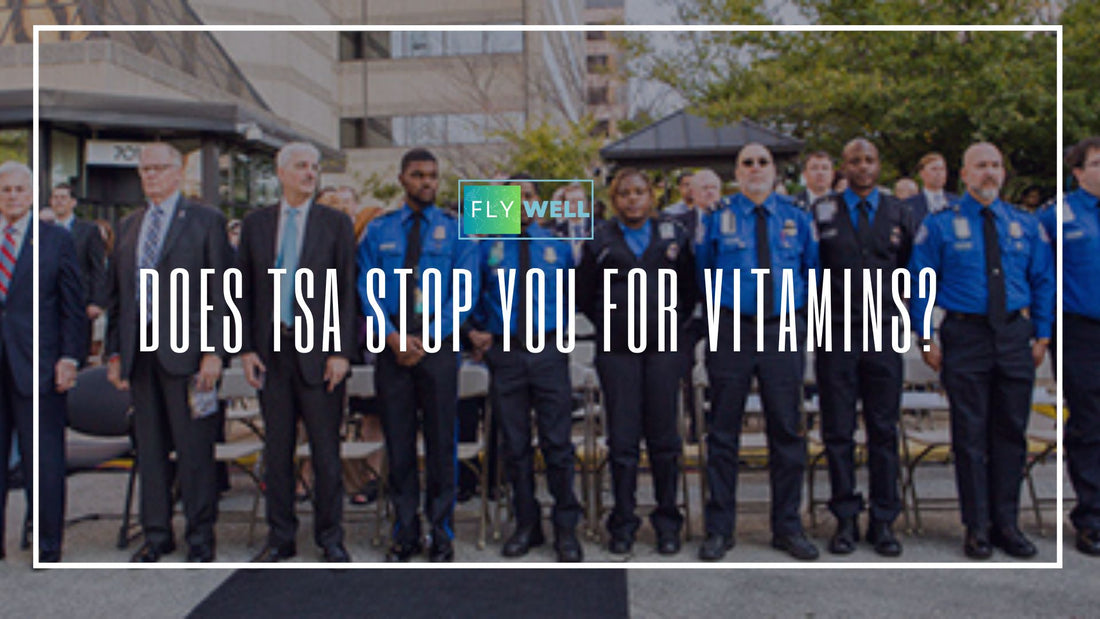Navigating airport security can be a meticulous process, especially when it comes to carrying vitamins in your carry-on. The Transportation Security Administration (TSA) has specific guidelines regarding the transportation of vitamins, which can lead to potential hold-ups during security checks. Understanding the rules and regulations surrounding vitamins can prevent unnecessary delays and ensure a smooth travel experience. So, what exactly do you need to know before heading to the airport with your vitamin stash?
Key Takeaways
- Store vitamins in original packaging for easy identification and comply with TSA regulations.
- Different forms of vitamins are generally allowed, but check specific guidelines for each type.
- Understand the quantity limits and packaging requirements to avoid delays during security screening.
- Familiarize yourself with TSA regulations and common mistakes to ensure a smooth travel experience with vitamins.

TSA Regulations on Vitamins
When traveling through airports, the Transportation Security Administration (TSA) has specific regulations regarding the carrying of vitamins in your luggage. It is advisable to store vitamins in their original packaging to ensure easy identification. Common vitamin brands are generally accepted, but it is recommended to carry them in quantities suitable for personal use to avoid customs issues. Check the expiration dates on your vitamins to comply with TSA guidelines. When going through security, separate your vitamins from other liquids or gels to facilitate the screening process. Understanding these regulations can help prevent any delays or complications at airport security checkpoints, ensuring a smoother travel experience.
Allowed Vitamin Forms
Various forms of vitamins are permitted for travel through airport security, subject to specific guidelines set by the Transportation Security Administration (TSA). Powdered supplements, chewable tablets, gummy vitamins, and capsules are all generally allowed in both carry-on and checked baggage. It's important to ensure these items are properly labeled and in their original packaging for easier inspection. Topical creams fall under the category of allowable vitamin forms as well, but they must comply with the TSA's liquid restrictions. While the TSA generally does not restrict these common forms of vitamins, it's advisable to check the latest guidelines before packing to avoid any potential issues during security screening.
Liquid Vitamin Restrictions
For travelers carrying liquid vitamins, adherence to the Transportation Security Administration's (TSA) specific restrictions is imperative to ensure a smooth passage through airport security checkpoints. While the TSA permits vitamin powder without restrictions and vitamin capsules within the carry-on limit, liquid vitamins have exceptions. Liquid vitamins must adhere to the 3-1-1 rule, which means containers cannot exceed 3.4 ounces (100 milliliters) and must fit into a single quart-sized clear plastic bag. Unfortunately, vitamin gummies face limitations due to their gel-like consistency falling under the liquid category. It's essential for travelers to be aware of these guidelines to prevent delays and ensure compliance with TSA regulations when traveling with liquid vitamins.
Vitamin Quantity Limits
Vitamin quantity limits set by the Transportation Security Administration (TSA) play a crucial role in ensuring compliance with airport security regulations for travelers carrying vitamins. When it comes to transporting vitamins, there are specific considerations to keep in mind:
- Vitamin dosage: Travelers must adhere to the TSA's limits on the quantity of vitamins they can carry to ensure security measures are followed.
- Supplement brands: Certain supplement brands may contain different ingredients that could impact the allowable quantity when passing through airport security.
- Vitamin customs: Understanding the customs regulations of the destination country is essential to avoid issues related to carrying vitamins across borders efficiently.
Being aware of these factors helps travelers navigate the airport security process smoothly while complying with travel restrictions.
Vitamin Packaging Requirements
Ensuring proper packaging of vitamins is essential for meeting TSA requirements and facilitating smooth airport security screenings for travelers. When it comes to vitamin packaging, it is crucial to follow specific guidelines to avoid travel mistakes and ensure compliance with international requirements. Vitamins should be kept in their original packaging or properly labeled containers to assist the screening process. Different supplement forms like liquids or gels may have additional restrictions, so it's important to check the TSA guidelines before packing them in your carry-on. By adhering to the correct packaging requirements for your vitamins, you can help streamline the airport security screening process and make your travel experience more hassle-free.
TSA Screening Process
When navigating the TSA screening process at airports, travelers must be aware of specific security protocols to ensure a smooth and efficient experience. Understanding airport security procedures can help passengers navigate security checkpoints with ease. To facilitate the process, travelers should familiarize themselves with supplement rules to prevent delays or confiscation of items deemed non-compliant. Paying attention to vitamin screening guidelines is essential, as certain restrictions may apply to these travel essentials. Being well-prepared and knowledgeable about security regulations can expedite the screening process and contribute to a stress-free journey through airport security.
- Be Prepared: Have your supplements and vitamins easily accessible for inspection.
- Follow Guidelines: Adhere to the TSA rules regarding supplement packaging and quantities.
- Stay Informed: Stay updated on any changes to airport security protocols to avoid issues during screening.
Vitamin Labeling Guidelines
Navigating the TSA screening process at airports involves being well-prepared and adhering to specific rules, including guidelines for vitamin labeling. When traveling with vitamins, it's crucial to check the expiration dates to ensure potency. Additionally, maintaining compliance with the recommended dosage is essential. When going through customs, declaring any vitamins you have is recommended to avoid delays or issues. Proper storage tips, such as keeping vitamins in their original containers or using pill organizers, can help prevent damage or spills during travel. Investing in travel containers specifically designed for vitamins can also aid in organization and ease of transportation. By following these guidelines, travelers can ensure a smooth experience when bringing vitamins through airport security.
International Travel Considerations
International travel necessitates comprehensive preparation to address various considerations, including cultural differences, language barriers, and potential health risks. When traveling internationally with vitamins, it is essential to pay attention to specific factors:
- Vitamin storage: Ensure your vitamins are stored properly to maintain their efficacy during your trip.
- Vitamin expiration: Check the expiration dates of your vitamins to avoid carrying expired products.
- Vitamin customs: Be aware of the customs regulations regarding the importation of vitamins into your destination country.
Taking these precautions will help you navigate international travel smoothly and ensure you have your necessary supplements without any issues related to storage, expiration, customs, security, or documentation.
Prescription Vitamins Approval
In the realm of international travel and health management, obtaining approval for prescription vitamins is a critical aspect that necessitates careful attention and adherence to regulatory guidelines. When carrying prescription vitamins, ensuring the correct dosage is essential to comply with regulations. Prescription verification may be required to confirm the necessity of the vitamins. Liquid restrictions imposed by security measures should also be taken into account, especially if the vitamins are in liquid form. Travel exemptions for prescription vitamins may apply in certain circumstances, but it is advisable to check with relevant authorities beforehand. Security checks at airports may involve additional screening for prescription vitamins, so having necessary documentation readily available can facilitate the process and avoid delays.
Additional Supplement Restrictions
When considering the transport of prescription vitamins, travelers should also be mindful of potential restrictions that apply to additional supplements beyond those specifically categorized as prescription medications. It is important to understand the regulations surrounding these supplements to ensure a smooth travel experience. Here are some key points to consider:
- Vitamin storage: Different supplements may have specific storage requirements to maintain their potency and effectiveness.
- Vitamin customs: Customs regulations vary from country to country, and certain supplements may be restricted or prohibited in some regions.
- Vitamin security: Ensuring the security of your supplements is crucial to prevent any tampering or contamination during travel.
Being aware of these factors can help travelers navigate vitamin inspection processes and declarations more efficiently.
TSA PreCheck Benefits
Enhancing travel efficiency through TSA PreCheck Benefits is a key consideration for frequent flyers and those seeking expedited security screening. This program allows travelers to experience smoother transitions through airport security checkpoints, reducing wait times and the need to remove travel essentials like laptops, liquids, belts, shoes, and light jackets. The PreCheck program offers a more seamless process, where individuals are not required to remove their shoes, laptops, liquids, belts, or jackets, making the security screening process more efficient. Travelers enrolled in PreCheck can also keep their carry-on items consolidated, providing a convenient and time-saving experience at airport security. These benefits make TSA PreCheck a valuable option for frequent travelers looking to streamline their airport experience.
Common Vitamin Travel Mistakes
To avoid potential travel disruptions, it is important to be aware of common mistakes travelers make when carrying vitamins through airport security checkpoints. When traveling with vitamins, consider the following tips:
- Packing tips: Ensure your vitamins are easily accessible for inspection to avoid delays at security checkpoints.
- Storage solutions: Store vitamins in their original containers or a pill organizer to prevent confusion and ensure identification.
- Brand options: Opt for reputable vitamin brands with clear labeling to ease security concerns and ensure compliance with regulations.
Conclusion
In conclusion, navigating TSA regulations regarding vitamins can be akin to a complex puzzle, requiring travelers to carefully adhere to guidelines on allowed forms, quantities, and packaging. Failure to do so may result in delays or confiscation at security checkpoints. It is crucial for travelers to understand the rules and plan accordingly to ensure a smooth journey. Just as vitamins nourish the body, compliance with TSA regulations nourishes a stress-free travel experience.

